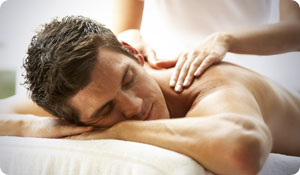
Don't let fear of the unknown keep you from this beneficial practice. There are many healthy reasons to schedule a massage for yourself. Here's a rundown on what you can anticipate before, during, and after a massage.
Before Your Massage
It may sound counterproductive to "plan" for what's supposed to be a relaxing experience, but there are a few things you should keep in mind before your session.
There are female and male masseuses. For your overall comfort, it's acceptable to request one or the other when you make your appointment.
First be sure to shower beforehand. The masseuse will have her bare hands on your skin, so ensuring that your exterior is clean is polite. Additionally, avoiding heavy meals directly before your appointment will contribute positively to your overall comfort levels.
When you arrive, your masseuse will ask you a variety of questions. According to the American Massage Therapy Association, the inquiries may include:
- Your desired results
- Your motivation for wanting a massage
- Your overall health or any particular areas of pain
- Any allergies you may have
Massage is not a one-size-fits-all therapy; so be honest with your therapist about your goals and needs to ensure you get the most out of the massage.
Finally, before the session begins, your massage therapist may ask you to undress after she leaves the room. If you have any reservations, be sure to communicate that. However, keep in mind that your massage will be most effective if the therapist can actually touch your skin. Once your clothing is removed, lie on the table and place the sheet or towel over your buttocks.
If you prefer, it is acceptable to keep your underwear on during the massage.
During Your Massage
Most massages require the use of oils or lotions to reduce drag on the skin. If you're allergic to any oils or lotions or have sensitive skin, inform the therapist before the massage begins.
Depending on the type of massage and the tightness of your muscles, a variety of techniques could be used including: rubbing, pressure, rocking, kneading, friction, and compression. While some minor discomfort is normal to work out "knots" from the tissue, if you experience any significant pain, make sure you communicate that with the therapist.
You can let your masseuse know if you'd prefer deeper or lighter pressure as the massage continues. You may find some areas, such as the lower back, are particularly sensitive to manipulation.
Finally, be sure to breathe normally and deeply. Try to clear your mind of to-do lists and upcoming tasks. Contribute to the overall effect of the massage by allowing your body and mind to relax.
After Your Massage
According to the American Massage Therapy Association, it's essential that you drink plenty of water afterward. During the massage, the muscles are stimulated, and salt and other minerals are released along with lactic acid. Drinking water helps your body dispose of any accumulated materials in the muscles. By providing the body plenty of water, you can help sweep away waste materials.
If you feel dizzy or light headed after your massage, do not get up too quickly. This is a common reaction and one that typically is resolved after you drink some water and sit for a moment.
Finally, you may experience some soreness the next day or even the day after that due to the massage. Again, this is common. However, if you experience prolonged soreness or pain, contact your massage therapist.
Massage can be a healthy form of stress release as well as a beneficial ingredient in your overall healthy body plan. Don't let fear of the unknown keep you from embracing this beneficial experience.





